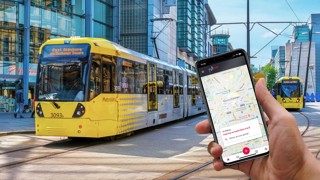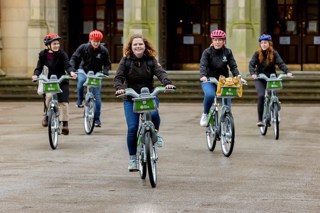By Sandra Witzel, head of marketing at SkedGo
Mobility as a Service (MaaS) is a hot topic these days, particularly with the monumental changes that are happening within the transport sector.
The rise of electric cars, micromobility such as e-scooters, ride sharing and active travel are all part of a shift to greener modes of transport.
Statistics show a shift is desperately needed. The Office of National Statistics highlighted that road traffic has increased in Britain by nearly a third since 1990, with a six per cent increase in greenhouse gas emissions from road transport.
So what is MaaS and how can it help? At its simplest, it’s a way of aggregating all available transport modes so individuals can plan, pay and manage every leg of their journey.
Part of the appeal is that MaaS apps can alert users to problems with their journey, reroute and display personalised options – including the ability to reduce carbon emissions from the travel choices they make.
MaaS can link up active travel such as walking and cycling with other forms of mobility like public transport, micromobility and ride hailing.
Travellers have the incentive to continue to use MaaS because it delivers results based on their personal preference, for example choosing to be more environmentally friendly. Advanced MaaS solutions, like SkedGo’s platform, already display carbon emissions per trip and allow the prioritisation of low carbon trips.
It’s not only individuals who benefit. Businesses can use MaaS as part of their corporate social responsibility (CSR) policy.
If an organisation can change employee commuting behaviour, they could significantly reduce carbon. Instead of a single-vehicle commute, someone may look at the various suitable trip chain options and either share their transport or leave the car at home.
Over time, tracking carbon reduction can be very motivating, encouraging individuals to keep up the momentum. From a business perspective, it also adds credibility to CSR efforts, not to mention cost reduction. This could mean fewer company cars and parking spaces – space that could be re-utilised for other purposes.
Governments are keen to support MaaS too, particularly to ensure it aligns with public policy goals. Nordic countries like Finland have been at the forefront of this movement, adopting new legislation to enable MaaS.
Rightly so, given the aim is to get people out of their cars and towards more sustainable travel options.
As a result, MaaS could be part of the solution to help governments move closer to their carbon reduction targets, while also helping to create a better travel experience overall thanks to the greater integration of transport and payment options.
There are still barriers we need to overcome, including the increased need to share data, regulation to protect users and discourage monopolistic behaviour, whilst still encouraging innovation. But if approached intelligently, not only could MaaS be good for transport users, it will prove good for the planet too.



















Login to comment
Comments
No comments have been made yet.